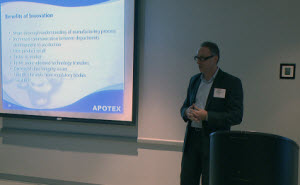Executive Summary by volunteers Anastasia Tzirtziganis and Mitchell R. Fong
Shlomo Bibas, VP Global Operation & Chief Information Officer, hosted Toronto Chapter members and colleagues at the Apotex facility in Etobicoke. With 25% of the prescribed pharmaceutical marketplace, Apotex fills 88 million prescriptions per year in Canada. On top of that, 75% of their production is exported to the United States
The Apotex Global Enable Operations team “drives business value through operational efficiencies, compliance and innovation.” Focused on providing the business not necessarily what it “asks for” but rather what the business actually wants, the team has evolved from order taker, through enabler, driver and finally innovator.
Innovation in Manufacturing
Products are more complex, especially with active time release products. Two cost-saving advances in technology are:
- Mini-tabs: Replaces 600+ “tiny time pills” to 10 mini-tabs which deliver enhanced operating efficiencies.
- Hot Melt extrusion: By feeding polymers and active ingredients into a melting and mixing process, a homogenous product is produced that is of improved product quality.
The Pharma manufacturing technology environment is evolving as well. Strict rules around validation and data integrity continue to be challenging when dealing with legacy equipment (which is being increasingly virtualized) and isolating portions of the network. Government regulations require every “saleable” item to have a unique serial number, which requires high upfront capital costs and put constraints on innovation. In order to comply with the “serialization,” a complex architectural system was implemented to provide an Advanced Track and Trace for Pharmaceuticals, integrating government regulations, wholesalers, ERP and the packing devices. By implementing these innovations in the process, the products are “Compliant by Design” and focus can be on reviewing results that are the exception. Integrating multiple workflows into one central Electronic Batch Record System will allow the industry to highlight quality issues in mid-production, have more complete data, and eliminate human error, all of which are developments that are encouraged by regulatory bodies.
Conclusion and Nuggets
Dr. Jeremy Desai, President and CEO of Apotex, praised the recent innovations within the organization. In the past, there was more focus on cost efficiency. The new approach highlights the benefits of developing new ideas that enhance the organization’s productivity and innovation.
- Organizations need to shift their mindset and strategy to allow Business, Technology and other reporting lines to engage early in Projects. As organizations take those first few steps to evolve, the rate of adoption steadily increases. The proliferation of ideas and innovation can transform a department so that it is no longer viewed as a Cost Centre. Business Strategies must be identified on a Road Map for them to be realized. The value of each initiative needs to be documented and measured to completely understand the Benefit Realization.
- Rather than keeping the Pharmaceutical’s innovation in manufacturing a trade secret, organizations should be more transparent and open where possible, sharing and cheering on the enhanced strategies and operational processes. In such a highly regulated industry, the operations cycle for creating medicines and pharmaceuticals is already complex. It is becoming more common for multiple companies to collaborate on manufacturing to improve production of the various required components. Within corporations, shifting internally towards shared service organizations allows for the best resources to be fit with the appropriate project, providing increased effectiveness and cost savings that will be reflected for the prices charged to consumers.
- The buzz word continues to be Culture! If a company wants to become innovative, the change must be both top down and bottom up. Human resources and leaders within every department should plan a phased Organization Change Management approach to help prepare employees for the extensive change that is undertaken.
Anastasia Tzirtziganis is pursuing a commerce degree in Global Management Studies, specializing in Digital Entrepreneurship and Innovation, at Ted Rogers School of Management, Ryerson University.
 Mitchell R. Fong, PMP, CSM is a Management Consultant and Program Manager. As Board Advisor and Educational Foundation Liaison with the Project Management Institute, Mitchell's mandate is to engage the membership, grow the profession globally, and improve the quality of PMs locally.
Mitchell R. Fong, PMP, CSM is a Management Consultant and Program Manager. As Board Advisor and Educational Foundation Liaison with the Project Management Institute, Mitchell's mandate is to engage the membership, grow the profession globally, and improve the quality of PMs locally.

